Click to Download Document [pdf] - Trinitarian Bible Society
Click to Download Document [pdf] - Trinitarian Bible Society
Click to Download Document [pdf] - Trinitarian Bible Society
- No tags were found...
You also want an ePaper? Increase the reach of your titles
YUMPU automatically turns print PDFs into web optimized ePapers that Google loves.
<strong>Trinitarian</strong> <strong>Bible</strong> <strong>Society</strong> – Quarterly RecordVersion—with the Old Testament addedin 1952.There have been five major versions inKiSwahili: Kiugunja in 1891, Kimvita in1914, Roehl in 1937, 16 the Swahili Unionin 1952, and Habari Njema in 1996. Themeaning of the last-named will indicatethe pedigree of this chain; ‘Habari Njema’means ‘Good News’. It was begun in1973 as an inter-denominational andinternational effort; Roman Catholic andProtestant traditions were accepted in thisedition. At the risk of repeating myself,how great is the need for a sound <strong>Bible</strong>version in this widely-used language!TBS has been investigatingfor some time what can bedone in this language, but wedo not yet have a firm projectin hand; please pray that theLord would provide us withsuitably qualified personnel <strong>to</strong>undertake the much neededwork of preparing a faithfuland accurate version of theSwahili Scriptures translatedout of the original <strong>to</strong>ngueswith reference <strong>to</strong> the best ofthe former translations. Of theseventy-four people groups inKenya, eighteen are listed in OperationWorld as unreached. TBS has involvementin only two Kenyan <strong>Bible</strong> projects, Pokotand EkeGusii.Pokot (Pökoot)In 1931 Christian missionaries establisheda work in the Turkana region of Kenyaamong the Pokot. The <strong>Bible</strong> Churchmen’sMissionary <strong>Society</strong> (Anglican) set up aministry in Kacheliba, and about thesame time the African Inland Missionbegan work at Maron among the eastPokot. These missionaries found the Pokotresistant <strong>to</strong> Christianity, as well as <strong>to</strong>education and other development help,and the Pokot have sustained a reputationfor resistance <strong>to</strong> Western and Christianinfluences.About half of the Pokot are semi-nomadic,semi-pas<strong>to</strong>ralists: people who herd cattle,sheep, and goats and live off the productsof their s<strong>to</strong>ck. Others are agriculturalists,living wherever conditions allow farming.Pokot society is thoroughly paternalistic: awoman has no voice in any public forums;she has no authority within her ownhomestead, being considered as ‘foolish’ asthe cows for which she is traded.Believing that death is the end of life, withno afterlife, this present world is mostMr and Mrs Tottys’ home <strong>to</strong>dayimportant and is precious <strong>to</strong> the Pokot.Much of their religious ritual is involvedin warding off illness or in effecting cures.Most Pokot still follow their traditionalreligion: approximately 15% of Pokot aredesignated Christian while the remaining85% are traditionalists. Even among theChristians, the traditional religion worldviewis still dominant.A notable missionary <strong>to</strong> the Pokot wasLawrence Totty. Born in Welling<strong>to</strong>n,Shropshire, in 1908, later moving <strong>to</strong>Cheltenham, in the late 1920s he becamea missionary for the <strong>Bible</strong> Churchmen’sMissionary <strong>Society</strong> (BCMS, now Crosslinks).In 1930, the BCMS sent him <strong>to</strong> Kacheliba,26


![Click to Download Document [pdf] - Trinitarian Bible Society](https://img.yumpu.com/44904205/28/500x640/click-to-download-document-pdf-trinitarian-bible-society.jpg)
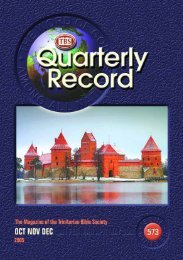
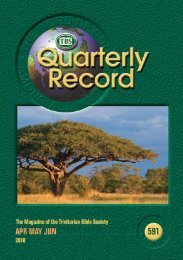
![The Love of the Truth [pdf] - Trinitarian Bible Society](https://img.yumpu.com/49788277/1/184x260/the-love-of-the-truth-pdf-trinitarian-bible-society.jpg?quality=85)
![Bible Word List and Reading Plan [pdf] - Trinitarian Bible Society](https://img.yumpu.com/46882563/1/177x260/bible-word-list-and-reading-plan-pdf-trinitarian-bible-society.jpg?quality=85)
![Download Document [pdf] - Trinitarian Bible Society](https://img.yumpu.com/44584740/1/184x260/download-document-pdf-trinitarian-bible-society.jpg?quality=85)
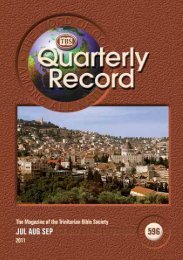
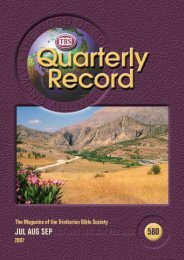
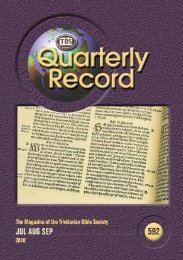
![Download Document [pdf] - Trinitarian Bible Society](https://img.yumpu.com/41007786/1/184x260/download-document-pdf-trinitarian-bible-society.jpg?quality=85)
![Click to Download Document [pdf] - Trinitarian Bible Society](https://img.yumpu.com/40894484/1/188x260/click-to-download-document-pdf-trinitarian-bible-society.jpg?quality=85)

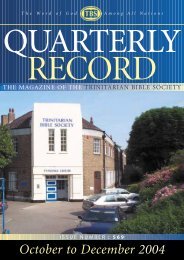
![Download Document [pdf] - Trinitarian Bible Society](https://img.yumpu.com/39425868/1/184x260/download-document-pdf-trinitarian-bible-society.jpg?quality=85)
![Download Document [pdf] - Trinitarian Bible Society](https://img.yumpu.com/39425821/1/184x260/download-document-pdf-trinitarian-bible-society.jpg?quality=85)